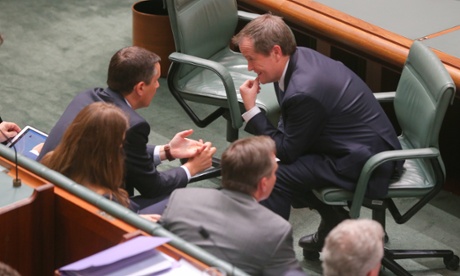
Night time politics wrap
Here’s what we know that we did not this morning:
- Nova Peris said emails regarding her private life were a result of a child custody dispute, which was known by the NT News, and rejected any suggestion of wrong doing.
- The attorney general George Brandis has given himself the power to tick off on any prosecution of journalists under the first national security laws, to head off discontent amongst the media over what he calls is wrong interpretation.
- AFP commissioner Andrew Colvin confirmed that the data retention bill, which was introduced to parliament today, could be used to target illegal downloading. The bill, which forces telcos and ISPs to hold data for two years, was referred to an inquiry.
- Former Howard advisor and diplomat Michael Thawley was appointed to replace Ian Watt as head of the Prime Minister and Cabinet.
- The debate over the Carbon Farming Initiative bill to enact Direct Action resumed in the senate.
- The foreign fighters bill passed the house and is on its way to becoming law.
Parliament does not resume until November 17 when the senate sits.
Thanks to Mike Bowers, Daniel Hurst, Lenore Taylor, Shalailah Medhora and the readers.
Goodnight.
We would like to have more women but we need experience, says the Michaela Cash, minister assisting the prime minister for women, Tony Abbott.
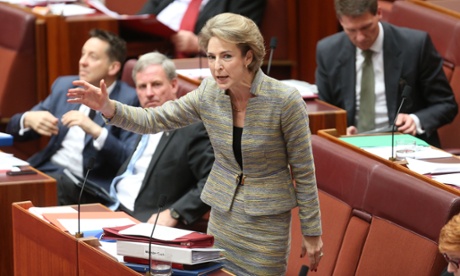
A day after Julie Bishop said she did not find the term feminist particularly useful, Cash was asked about the low representation of women in cabinet.
In senate question time, Labor asked: I refer to Liberal MP Teresa Gambaro’s comments today, ‘The situation we have now with there being only one woman in cabinet is one that cannot be allowed to continue.’ Does the minister agree with Ms Gambaro?
Cash referred again to the “knifing of Julia Gillard” and then used an explanation of the low cabinet numbers from Tony Abbott himself.
I was getting to the Prime Minister, when he was the Leader of the Opposition, telling the Australian people about the shadow cabinet that we would be taking to the election and the fact that at that time it included two women. He said, ‘Because of the level of debt that we are going to inherit from the other side, we believe that we require experience.’ Our now cabinet has 15 ministers who were in the former Howard government ministry.
Of course, Sophie Mirabella famously lost her seat and now there is only one.
Julie Bishop.
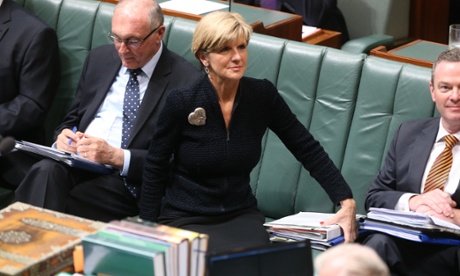
Whom I thought was a bit of a hero in the Coalition. Until I saw Nikki Savva’s column in the Oz:
Pretty soon there will be sniping about Julie Bishop. Either that or she will be written out of the script. Oh wait, that could be happening already. The deputy leader, the only female member of the cabinet and the (now) obvious successor to Abbott, was left off the invitation list for the launch by the Prime Minister last night of a new group set up by his chief of staff, Peta Credlin, designed to mentor and promote female Coalition staff, including getting into parliament if they want.
The snub to Bishop was not personal but it was calculated. No other female MP — backbencher or minister, including Michaelia Cash, the Minister Assisting the Prime Minister for Women — had been invited, and boy (or girl) were some of them miffed, their miffedness not abated by prime ministerial invitations to another function today to celebrate “women of the future”. Talk about short-sighted. If the plan is to get more women into parliament, separating them from the women already there sounds counterproductive. And a bit weird.
A firm believer in mentoring, Bishop paid a gracious tribute to Credlin yesterday for organising the network. Through her performance at the National Press Club Bishop showed why she is where she is. No complaints, no excuses, no crutches. Just hard work and no nonsense. Talk about a class act.
The lower house is now on the adjournment debate. But we have senate additional estimates, with the department of environment in the hot seat.
An AFP spokesman has provided this.
The AFP received a referral on 2 October 2014 from Senator Nova Peris in relation to a number of matters. The AFP is continuing to evaluate this referral as per usual process. While this process is ongoing it would not be appropriate to comment further.
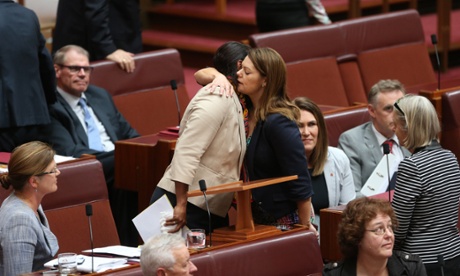
Mr President, There are three things guaranteed in life. We will all die at some stage, each day the sun will set and it will rise again tomorrow. Today is just one of those days.
That is the whole of Nova Peris’ statement to the senate.
Nova Peris answering allegations in the senate:
I have spoken to Cathy Freeman in person. Our friendship remains strong and we will continue to support each other. Despite the hopes of some, this incident would not stop me from serving the people of the Northern Territory and advocating on behalf of Aboriginal Australians.
Last night in the Northern Territory parliament a report was tabled that showed the number of Aboriginal children that have been taken from their parents and put into care has increased by 26% last year. This and many other stories like it deserve this nation’s attention.
There is so much to be done by the people whom I represent in this place.
I stand here today, proud of who I am, proud to be a mother, a grandmother, a daughter and a wife. My children are my universe and I will protect and nuture them no matter what people say about me. Now or in the future.
I don’t propose to provide any further commentary on this matter.
Nova Peris on the allegations:
Three weeks ago on the 9th of October I received a further email from the representative of this aggrieved party. The first line read I am sending this communication to you today to ensure there is no mistake as to who is responsible for releasing the information in relation to you. The release and publication of these emails was an attempt to extract money and embarrass me and my family. With legal options now exhausted, this other party has turned to the media.
I can inform the senate the Northern Territory News was well aware these emails were part of a long running family dispute ahead of its publication.
Nova Peris on the allegations:
The NT News has not revealed who provided it with private emails though News Limited has claimed that its source is credible. The facts are these.
On the 19th of October 2010, the aggrieved party in the financial estate and child access dispute involving me and my children emailed and revealed he had in his possession a folder of information pertaining to Mr Boldon’s visit to Australia. I did not realise at the time he was referring to these emails. On the 21st of March this year a representative of that aggrieved party emailed me and said unless his wishes were granted she would take such action and I quote “will only result in causing major trauma for everyone especially the children and damage the reputation of some stakeholders”.
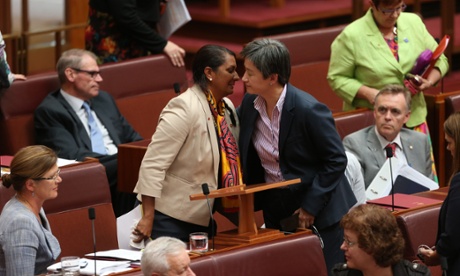
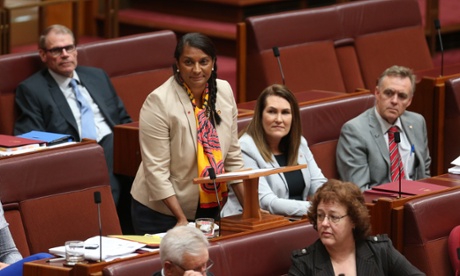
Nova Peris in the senate on allegations:
I categorically reject any wrongdoing. I have done nothing wrong. It pains me to have to talk about my private life but the publication of these emails is part of a long running and very difficult child access and financial estate dispute. During this process I have been subjected to many threats. In dealing with these threats, I have faced the dilemma of responding to defend my political career or responding to defend my children. Well, Mr President, it’s not actually a dilemma. I have always put my children first and will continue to do so.
Nova Peris on the allegations:
The excuse for the reports is the claim that I was responsible for a misuse of public funds. This claim is baseless. Firstly I was not responsible for the payment or acquittal of money used to fund Mr Boldon’s trip. Athletics Australia has confirmed that in April 2010, Mr Boldon toured Australia as an ambassador and mentor for the jumpstart to London program. Athletics Australia has confirmed that my role was establishing initial contact with Mr Boldon. Athletics Australia has also confirmed it paid for Mr Boldon’s return flights from Los Angeles to Melbourne, his accommodation and reasonable expenses. Athletics Australia also says and I quote, “Mr Boldon capably fulfilled his role as a mentor and ambassador to the Jumpstart to London program and provided a boost to the profile of the program and for the sport of athletics in general”. This afternoon the Australian Sports Commission has said the use of sports ambassadors for programs like this was common and Athletics Australia has and I quote fully acquitted the funds provided including independent auditor confirmation that it was spent for the purposes provided.
Just to recap.
Nova Peris says the allegations relate to a trip by Ato Bolton at a time when she was separated from her ex-husband, Daniel Batman, who is now deceased.
There are serious questions about how the NT News got the emails and cannot comment on their veracity...What I can say is the views attributed to me over the past few days based on the publications of selected words contained in private emails which I don’t have certainly don’t reflect my views. They don’t reflect my values and the evidence of this is the life I have led and continue to lead.
Updated
Nova Peris says there are so many other stories to be told about indigenous Australians.
Three things are guaranteed, Peris says, we will all die, the sun will rise, the sun will set.
Today was just one of those days.
Updated
Nova Peris says the allegations relate to a wrangle between “an estate” and Peris.
Peris knew the allegations were coming.
Three weeks ago, she was warned there would be emails appear and the NT News were also warned that it was part of a legal case.
Nova Peris answers allegations
Nova Peris stands and says she is overwhelmed by the support she has received. In a shaky voice, she says her main concern was for her kids.
The allegations relates to her time of marriage with her now ex-husband.
She knows Ato Boldon has said emails were fake.
She says the emails don’t reflect her views and values.
The excuse for the report was that she was responsible for the funds. (This refers to the so-called public interest in the story.)
Updated
Labor MPs T Watts, M Rowland, J Chalmers, J Macklin, K Ellis, J Ryan, P Conroy, A Rishworth, W Snowden in Senate to support Peris #auspol
— Kerrin Binnie (@kerrinbinnie) October 30, 2014
Labor members and senators are gathering in the senate as a show of solidarity for Nova Peris, who is about to make a statement.
New Zealand police sent into Brisbane to bolster the ranks for the G20 summit could be immune from disciplinary action even though they will be temporarily sworn in as Queensland police.
My colleague Joshua Robertson reports:
The 1,500 New Zealand and interstate police sent to bolster G20 security in Brisbane will be exempt from local investigation of public complaints.
Any allegations of mistreatment by those officers, who will make up a quarter of the largest peacetime security force in Australian history, would instead have to be pursued with oversight bodies in Auckland, Sydney and elsewhere.
While outside officers are slated to play a background role, lawyers say their legal status affords them virtual immunity from disciplinary action over any involvement in rogue policing that, along with violence from protesters, marred previous summits.
Questions on work for the dole, another question from Labor on NATSEM, which Tony Abbott speaks around.
Last government question on construction unions to Christopher Pyne. He takes the mickey out of a move by Bill Shorten to ban bikie colours on building and construction sites.
They can still do stand over tactics, as long as they’re wearing the right gear. As long as they’re wearing the right gear. Take off their colours, plain-packaging thuggery is fine, says Pyne.
A question on ebola to health minister Peter Dutton outlining the government’s preparations for the disease.
A Labor question to Christopher Pyne: I refer to NATSEM modelling which shows that under the PM’s unfair university changes, a young woman studying to become a vet would owe over $437,000 for her degree, meaning she would never repay her help debt. Why does the PM want to straddle millions of Australians with a debt sentence?
If I’m not mistaken, the education minister Christopher Pyne just accused NATSEM of bodging up its findings to suit the stance of its university.
There is no credibility to the NATSEM modelling whatsoever. NATSEM is housed at the only university in Australia that has not fulsomely endorsed these reforms, the only one, the University of Canberra. Every other university is supporting reform of the higher education sector, because they know that we need to get more revenue to universities.
A government question to Warren Truss on infrastructure.
A Labor question on saddling university students with debt under the government’s deregulation of higher education.
Abbott says no students will have to pay upfront and all fees will be covered by HECS or fee help and 50% of fees will be paid by taxpayers.
Labor asks Abbott: Will any companies owned by the (member for) Fairfax (Clive Palmer) be eligible for funding under the PM’s deal to pay for big polluters?
I haven’t looked at the Member for Fairfax’ share registry unlike members opposite that I’m sure pore over everyone’s financial details because that kind of class envy stuff unfortunately is still over there.
Helen Davidson has just filed an update on the allegations against Labor senator Nova Peris:
An independent audit of the $445,000 given to Athletics Australia for a program at the centre of allegations against Senator Nova Peris found no misuse of the money, despite an overspend in its Indigenous department of $140,000, the Australian Sports Commission has said.
The Australian federal police has also confirmed it has been investigating “a number of matters” on behalf of Peris since 2 October, after leaked intimate emails between the Northern Territory senator and the Trinidadian Olympic medallist Ato Boldon prompted accusations she had sought public funds to help carry out an affair.
Small business minister Bruce Billson is asked a government question about savings as a result of the carbon tax repeal.
Labor asks Tony Abbott about the budget cuts families face while the $2.5bn Direct Action scheme pays “big polluters”.
Labor asks Abbott: I refer to comments the PM made in parliament yesterday that the $2.2 billion petrol tax increase is a budget repair measure. The Government also claims that every dollar raised by the increased petrol tax will go towards roads. Can the PM confirm how much of the petrol tax collected will go to paying down debt?
Abbott does not give an amount as to how much will go towards the debt.
Michael Thawley appointed head of Prime Minister and Cabinet
The Governor-General has appointed former Howard advisor Michael Thawley as secretary of the Department of the Prime Minister and Cabinet for a period of five years beginning 1 December 2014.
Thawley was the senior adviser on international relations to John Howard. He was Australia’s Ambassador to the United States between 2000 and 2005 and has held senior Australian government positions including in the Department of the Prime Minister and Cabinet, the Department of Foreign Affairs and Trade and the Office of National Assessments.
Most recently Mr Thawley has been Senior Vice President of Capital Research and Management Company and of Capital Strategy Research Inc, one of the world’s largest investment management businesses.
Mr Thawley’s appointment follows the resignation of Dr Ian Watt AO.
Bruce and Denise Morcombe, parents of the murdered teenage Daniel, are in the public gallery to promote Day for Daniel on child safety. Both leaders pay tribute to them.
Shorten to Abbott: On Monday, the PM flagged an increased GST. On Tuesday, the PM ambushed Australian motorists with a petrol tax hike. On Wednesday, the PM did a dirty deal with the Palmer United Party to make big polluters, to give them more money. So after a week ofsmashing Australians with increased taxes and dirty deals, will the PM now apologise to all Australians for breaking his election promises?
We took Direct Action to two elections, we have done what we promised to do, says Abbott.
A question to immigration minister Scott Morrison on border security.
Labor senator Nova Peris is back in the senate after an absence during allegations aired by News Corp.
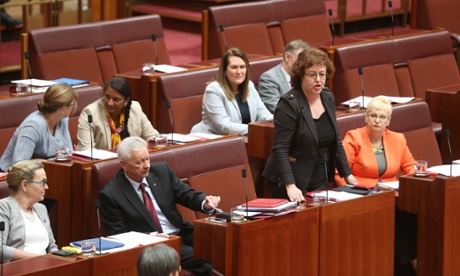
A Labor question on Direct Action. Having lambasted Labor for doing deals in government, Abbott says:
At least the crossbenchers are prepared to talk to the government, unlike members opposite that have dealt themselves into irrelevance on the most important economic questions facing our country.
A government question to Malcolm Turnbull on the data retention bill.
Turnbull says nothing is changing and quotes Giuseppe Tomasi di Lampedusa.
One can quote that great Italian writer Lampedusa’s novel The Leopard where the Count says everything has to change if we want everything to stay the same, and the fact is if we want our intelligence agencies to be able to have access to the material they’ve always had, then we have to have this data retention change.
Adam Bandt asks “the minister called the Minister for the Environment” about Direct Action which allows big polluters tax payers money or to ignore the scheme altogether.
Greg Hunt gives a dissertation on the failure of the carbon tax and the emissions trading scheme and then says:
Nobody gets anything under us until they reduce emissions, and overwhelmingly what we’re looking at is supporting the rural sector, of working with farmers, of working with communities, of making an absolute guarantee for protection of prime agricultural land and doing this in a way that reduces emissions, improves our economy and supports productivity.
A Labor question to Abbott quoting Malcolm Turnbull on Direct Action and its “fiscal recklessness on the a grand scale”.
Abbott says they will spend no more than allocated on Direct Action.
It’s a good policy because under this policy we will achieve our 5% cut.
A goverment question to Julie Bishop on the importance of shutting down terrorist funding sources.
Shorten asks Abbott given eminent economists have said that $4-5 billion per year will have to be paid to big polluters to reach Australia’s remission reduction targets. Given that his dirty deal doesn’t add up, can the PM confirm how much more will he take from Australian families to pay big polluters to achieve the emission reduction target?
There are dumb ways to reduce emissions and there are smart ways and we will support Direct Action.
He better clear that up.
A government question on foreign fighters. Tony Abbott says about 70 Australians are now known to be fighting with terrorist groups in the Middle East, 100 Australians are known to be supporting these terrorists with recruitment and funding at least 20 have returned.
First question on Direct Action to Tony Abbott.
Q: This morning market analysts Reputex confirmed that the PM’s $2.5 billion dirty deal with Clive Palmer will only deliver 20 to 30% of Australia’s target for carbon pollution reduction. The PM cannot have it both ways. Has he abandoned Australia’s carbon pollution reduction target, or will he take billions of dollars more from Australian families to give to big polluters?
It’s capped, costed and funded, as simple as that...we are confident that Australia will meet our emissions reduction targets, and we are confident that the by far the best way to help reduce emissions is with Direct Action and Direct Action is the smart way to reduce emissions.
This is interesting. Via Lenore Taylor:
Greg Hunt vows emissions trading is dead and won’t be revived for 20 years or more. But he has quietly given himself the power to bring back a form of carbon trading, and he has advice that if he doesn’t use it, Australia cannot meet the climate promises it has made to the world.
The seeds of an emissions trading scheme are buried in the deal Hunt did with crossbench senators. And the power for them to bloom into a new form of carbon trading also rests with him.
The catch is, if he doesn’t allow this to happen, Australia is very unlikely to meet its 2020 emissions reduction targets, and has almost no chance of meeting the deeper targets it will have to commit to after that.
In a few years the minister is very likely to face a choice – break the Coalition’s promise never to introduce any form of carbon price, or break Australia’s promise to the world about how much we would reduce greenhouse emissions.
The lonely boys.
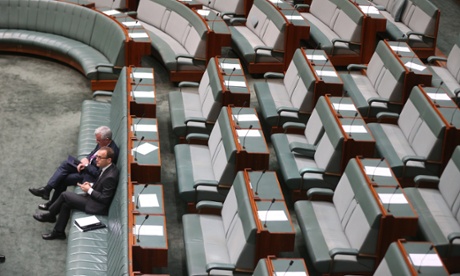
Updated
Lunchtime politics
-
The attorney general will have to approve any prosecution of a journalist for reporting on special intelligence operations, a move George Brandis says is aimed at quashing the “entirely false story” that the government’s new security laws could lead to such prosecutions.
-
Australian telecommunications companies and internet service providers will be required to store data about their customers’ activities for two years under new government legislation.
-
The data retention bill could target illegal downloads, according to the Australian Federal Police commissioner Andrew Colvin.
-
The foreign fighters bill passed the lower house, declaring no-go zones and jail for people travelling to conflict zones.
- The immigration minister Scott Morrison would have more powers to approve and revoke citizenship under a new bill, which extends the good character test.
Here is some more detail on the citizenship bill from the hansard:
The bill provides that approval must be cancelled if the minister is no longer satisfied of the applicant’s identity or if they have become a risk to national security. The bill further provides that the minister may cancel approval if satisfied that the person no longer meets other eligibility requirements.
The bill extends the maximum period of time where the minister can delay an applicant making the pledge of commitment from 12 months to two years, recognising that investigations into whether there are grounds for cancellation can take longer than 12 months.
The government is now resuming debate on the Australian citizenship and other legislation amendment which gives the immigration minister much more discretion for awarding and revoking citizenship. In other words, Scott Morrison will be able to assess good character and furthermore, the good character requirements will be extended.
Labor says the very long bill was dumped with undue haste and the government wants to rush it through the house, even though it has no bearing on the national security situation.
Labor’s Michelle Rowland says while the bill appears to be a “tune up” for the Australian citizenship laws, it requires more scrutiny because it goes to the very foundational definition of what it means to be Australian.
Labor is opposing the bill for procedural reasons, that is, they haven’t had enough time to go over the bill with a fine tooth comb.
A vote now on Bandt’s second amendment.
Labor’s shadow attorney Mark Dreyfus says the provision in the bill is not an attack on press freedom, as claimed by Adam Bandt.
We need to see this (Bandt’s) amendment for what it is. It is masquerading in some way as a defence of press freedom. Which it is not. The provision does not attack press freedom. And amending it is not a defence of press freedom.
Justice minister Michael Keenan, unsurprisingly, will not be supporting Bandt’s amendment.
He takes issue with Bandt’s charge the government was targeting certain communities.
The idea that we would not stand side by side with every Australian is untrue.
Keenan also takes issue with the idea that journalists were targeted in the bill. He said the bill targets recruiters of young Australians to fight in these wars.
This is not a new offence, it has been part of legislation since 1978 and it has never once been used to prosecute a journalist. We are just modernising the language, says Keenan.
The Greens Adam Bandt just lost his amendment and now he is having another go. He wants to remove the references to “news items” in the foreign fighters bill so that journalists don’t go to jail.
Labor couldn’t wait to pass the (first) laws and now they are out there wringing their hands. Well they were put on notice...vote with us now to protect journalists.
This amendment will ensure this loosely defined newly created “news items” will be taken out, says Bandt.
House now voting a Greens Adam Bandt amendment to the foreign fighters bill.
Independents Cathy McGowan, Andrew Wilkie and the Greens Adam Bandt voted against the foreign fighters bill.
Foreign fighters bill set to pass lower house
The foreign fighters bill is now in the lower house.
Andrew Wilkie has just delivered a cracking speech, banging the Coalition and Labor heads together in a what-the-hell-are-you-thinking kind of way.
Rather than understanding the limits that need to contain agency power, the former intelligence officer says the government is over-reaching on the national security laws.
It has betrayed the trust that has been put in it by the community to look after its security.
The house is now voting on the foreign fighters bill and so it comes to pass.
Data retention bill could be used to target illegal downloads
The data retention bill inspired a question which I missed regarding whether the news laws could be used to target illegal downloads. Andrew Colvin, commissioner of the Australian Federal Police, gave an answer which was pretty close to “blood oath”.
Q: Could this - once the legislation is through, could it be used, for example, to target illegal downloads, those responsible for that?
I haven’t even touched on some of the other range of crimes. Absolutely. Any interface, any connection somebody has over the Internet we need to be able to identify the parties to that connection. Not the content, not what might be passing down the Internet. Illegal downloads, piracy - sorry, cyber crimes, cyber security, all these matters, our ability to investigate them is absolutely pinned to our ability to retrieve and use metadata.
Malcolm Turnbull, perhaps hearing the sounds on online campaigns by techsavvy teenagers crashing in his ears, jumped in to cover the new AFP commissioner. It’s not such a big deal, says Turnbull. It’s happening all the time.
If I can flesh that outlet in terms of copyright, a lot of Internet piracy, you know, downloading and sharing copyrighted material unlawfully, is done by way of file sharing. I’m sure no-one here has any experience of it.
But the way that works is a torrent stream typically is created in which there are a whole number of computers all with their own IP addresses which are sharing this pirated content. What the rights owners do is they use different programs - Detectee is a common one - they participate in the swarm. They therefore identify the IP addresses of the computers that are infringing copyright and then they seek from the ISPs - when they’re able to do this with a subpoena of course - the account details of the holder.
Now, generally they do this pretty much in real time so the 2-year holding that data ... probably doesn’t make a big difference in terms of copyright infringement because they’re dealing much more with the here and now whereas the Police Commissioner’s interests often tend to be much longer term but that process of resolving an IP address to an account name is relevant and it happens all the time.
Updated
Last night Women in Media held a most excellent event in Canberra to bring together women journalists, politicians and communications types to network and discuss issues close to their hearts. The patron saint, Caroline Jones, gave a wonderful speech, hours after the foreign minister Julie Bishop spoke to the National Press Club for WIM.
In a similar vein, we can only guess, is a morning tea today hosted by the prime minister Tony Abbott in the parliament. Women in the press gallery were invited, at least most women in the press gallery, for a cuppa with Tony.
Unfortunately, notwithstanding the high ratio of women in the Canberra bureau of Guardian Australia, our invitation yet again got lost in the mail. Perhaps, it is winging its way down the halls in the beak of an owl, Harry Potter style.
We will keep you posted. Or not.
In the meantime, under the new administration, we may have to rename the Canberra organisation Some Women In Media. #swim #teamaustralia
We’re not dealing with that today.
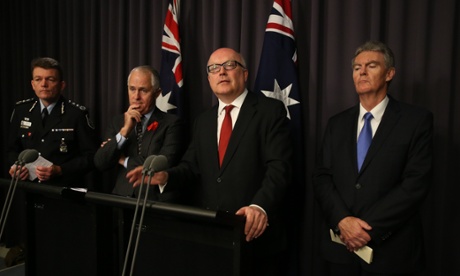
Gunfight at the O.K Corral
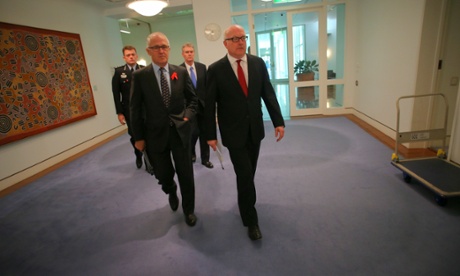
Shorten is dancing around the national security laws in a cringeworthy fashion.
Labor did propose an amendment to put belts and braces around this provision. The record reflects that. Having said that, what is also important here is there has been even louder concerns expressed now and I think the record also reflects that. Labor is responding to the concerns about free press and I think that what we are doing is a sensible proposition. We’re not undermining national security by saying there’s legitimate concerns. What we’re doing is drawing to the attention of the prime minister a provision in the Act which I believe provides a circuit breaker to deal with the concerns that have been expressed by many of your colleagues.
Louder concerns = media magnates.
Bill Shorten is asked about the Direct Action deal.
Is it prime minister Abbott or prime minister Palmer
Shorten is asked about his change of mind on the first national security laws.
I believe in recent days we’ve seen a quite a series of informed statements expressing concern about the rights of a free press under these laws which have been passed through the parliament.
Is it a recognition of a mistake?
I think it is always wise of people to listen to the community and politics is not just a photo of a particular moment and everything stops there. There have been considered contributions so the may have been unintended or unforeseen consequences.
Updated
Bill Shorten is up now on higher education at a Canberra school, talking about how much more degrees will cost under the deregulation proposed by the government.
Labor will fight the higher education changes with every ounce of energy.
George Brandis is asked about agencies going after journalist’s sources, if not prosecuting journalists.
We’re not dealing with that today.
George Brandis says he is largely in agreement with Labor’s senator John Faulkner, who this week called for a strong oversight body for the new laws.
Broadly speaking, the approach that Senator Falkner takes, which is that the agencies in this day and age need strong powers but those strong powers should be balanced by strong over sight mechanisms and strong safeguards is my approach and it’s a view that I have expressed very often, long before I read Senator Falkner’s paper so he and I are largely of one mind in relation to the approach to be taken here. We don’t want weak agencies, we want strong agencies with sufficient powers but we want to have a rigorous oversight regime, rigorous safeguards to ensure that they conduct themselves as of course they do in accordance with the law.
Malcolm Turnbull says the data retention bill is required because while telcos are already keeping data for often longer than two years. This bill is just around getting a uniform approach as companies make individual decisions as to how much data they keep.
AFP commissioner Andrew Colvin is talking about how important data retention is and was to Operation Appleby, which were the terror raids in Sydney.
George Brandis is back on the first national security laws, which he said were aimed at a Snowdon-like case rather than at journalists.
That provision is not about journalists, it was never directed to journalists. Journalists have taken umbrage at it and rather than let this false story continue to run, I have installed what I’m sure you will see is a very powerful safeguard by having the Attorney-General take personal and therefore political responsible for any prosecution were any ever to be considered but, as I also said, it’s barely imaginable in this country that that will occur.
George Brandis says the government will appoint an Independent National Security Legislation Monitor shortly.
Back to data rentention bill at hand.
This is Malcolm Turnbull’s explanation of the bill, which has been referred to the Parliamentary Joint Committee on Intelligence and Security (PJCIS).
The important thing to understand about this metadata bill, these amendments, is that it is not creating new classes of data to be retained and what it is seeking to do simply is to ensure that the ability of our law enforcement agencies, security agencies and police, are not diminished because changing technologies and changing business practices no longer require telcos to retain that type of data.
Brandis says under new power AG would never instruct prosecution of journalist
George Brandis assures the room that attorney general would not instruct a prosecution of a journalist.
That would mean that in the barely foreseeable, barely imaginable event that a journalist were the subject of a prosecution brief to theCommonwealth DPP, the Attorney-General as political official, as a minister, would assume immediate responsibility for allowing that prosecution to proceed. Let me stress, that does not mean the Attorney-General could instruct a prosecution. The Attorney-General can never instruct a prosecution. The prosecution can only be brought by the Director of Public Prosecutions but this would add a very powerful safeguard by providing that theAttorney-General would ber equired to consent to and therefore accept personal and political responsibility for a prosecution in the barely imaginable event that such a prosecution were brought.
Wow. All we needed was Lachlan Murdoch to come out. Who knew?
Attorney general must be consulted on prosecuting journalists
George Brandis is addressing the 35D powers in the first tranche of national security laws relating to journalists. He says almost all public discussion is wrong.
I have today decided to take advantage of the powers available to me under sectioning 8 of the Commonwealth Director of Public Prosecutions Act to give a direction to the Commonwealth Director of Public Prosecutions that in the event that the director had a brief to consider the possibility of the prosecution of a journalist under section 35p or under either of the two analogous provisions I have mentioned, he is required to consult me and no such prosecution could occur without the consent of the Attorney-General of the day.
Brandis stresses there are no new powers.
I want to stress, as Mr Turnbull stressed in his second reading speech, that this bill confers no new powers on ASIO,the AFP or on law enforcement agencies. They can already access metadata under the existing law. The purpose of the bill is to establish a common industry-wide standard for metadata retention and to ensure that metadata continues to be retained so that the investigative capabilities of the intelligence agencies and the police are not degraded.
George Brandis is explaining metadata. Watch out.
Metadata is information about the circumstances of a communication as opposed to the content of a communication. It is defined by the bill by reference to certain types of information. The identity of the subscriber to a communications service, the source and destination of the communication, the date, time and duration of the communication, the type of communication and the location of the equipment used in the communication.
Turnbull must have written it.
Lordy, it’s George Brandis as well.
Maate, have I got a deal for you.
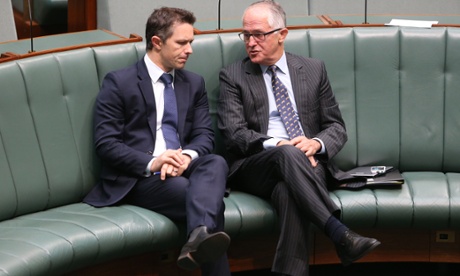
Malcolm Turnbull is coming up at a press conference on data retention.
As the house slides into the Anti-Doping Authority amendment, it gives me time to recall the PM’s science awards last night. Ollie Millman reported on the event here and by all accounts, the tepid response to the PM was a result of some serious cuts to science in the budget, not to mention the lack of a science minister.
But Tony Abbott batted on, again reminding the room that though there is no science minister, Ian Macfarlane, the minister responsible for science, is the son and the grandson of a scientist. That’s ok then.
Given the brain power in the room, Abbott brought out the big guns in his speech right at the outset.
It was said of Alexander the Great, when he saw the breadth of his dominion, that he wept for there were no more worlds to conquer.
Perhaps this is why Winston Churchill said “the empires of the future are the empires of the mind”.
Because that deep yearning to explore, to discover and to advance is part of the human condition – and now so much of it one way or another has to be intellectual.
The scientists in this room are the great explorers of our day.
In the spirit of Alexander the Great, having nailed the Emissions Trading Scheme, the mining tax, the Future of Financial Advice laws and many others, Tony Abbott must be weeping for there are no more Labor policies to conquer.
His job now is to get some Coalition policies through the senate. Again, as he did with medical researchers earlier in the week, Tony Abbott exhorted scientists to beat a path to senators’ doors to lobby for the $20bn medical research fund which relies on the $7 Medicare copayment. By the response of scientists, it does not sound very likely they will go into bat for a government which has taken dollars away.
For example, Sam Berkovic and Ingrid Scheffer won the $300,000 top prize at the awards for linking epilepsy to genetics.
Scheffer told Milman that she supported the government’s medical future fund, but not the GP co-payment.
I’d like to see a smarter, more innovative way of it being funded. A medical future fund is fantastic but we should be careful that it doesn’t affect the future of vulnerable people going to the doctor.
Anthony Albanese, as reported earlier, was there, albeit a little croaky. Not sure it it was a cold or a late night. Water was required.
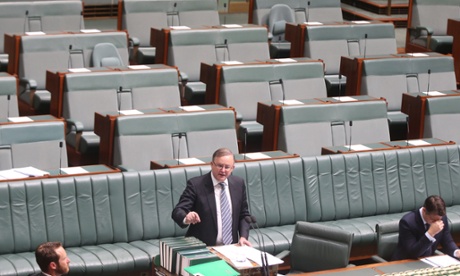
Liberal parliamentary secretary Steve Ciobo is introducing the Excise Tariff Proposals for the petrol tax rise.
The cogs are whirring this morning in the green chamber.
Not many Labor members turned up for the PM’s infrastructure statement.
Here is the PM speaking to the void.
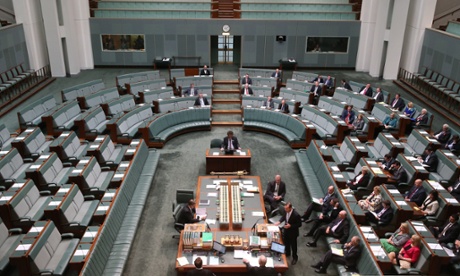
Cranes in the sky, bulldozers on the ground.
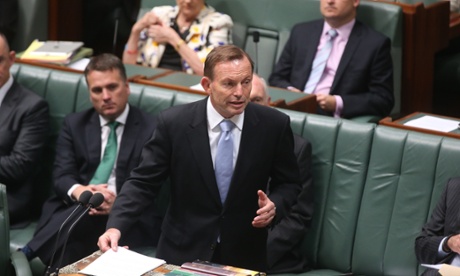
Malcolm Turnbull is going through the importance of the need to allow data retention, which forces Internet Service Providers and telecommunications companies to keep data for two years, “based on the advice of security agencies”.
The government recognises there are concerns with data retention, he says.
The bill will be referred to the Parliamentary Joint Committee on Intelligence and Security (PJCIS).
The bill will not require companies to retain the content or substance of communications.
The act will expressly exclude keeping web browsing history or infomration which would allow movements to be tracked.
Turnbull committed government to listen to the recommendations of the PJCIS.
He said the government will conduct good faith consultations with the industry, including with the Director General of Asio, the AFP commissioner and the head of Communications.
Updated
Malcolm Turnbull is now introducing the Telecommunications (Interception and Access) Amendment (Data Retention) Bill 2014.
Anthony Albanese, Labor’s infrastructure shadow.
Bulldozers? Bulldust, he said.
He said Labor was the one that did the heavy lifting. He says when Labor came to office in 2007, Australia was 20th in terms of infrastructure spending, when Labor left office, Australia was first.
Albanese says the reason Tony Abbott has failed in government on infrastructure is because he had no agenda because he was too busy demolishing Labor. Albanese says he came late to the idea of infrastructure because he realised he had no positive ideas for the election.
He accused Abbott of politicising Infrastructure Australia, pouring money into toll roads by private companies and dropping public transport projects. He says the government support of the East West Link in Melbourne was “to help a mate” - the Victorian Napthine government - and made payments years in advance at a time of so-called “budget emergency”.
He says the government also provided a concessional loan to WestConnex in Sydney that goes a very short distance in the first two stages with no cost benefit analysis.
Newsflash, do the cost benefit analysis prior to determining where the funding will go, says Albanese.
Albo says one of his constituents received two letters from a construction company on the same day. One said we need to buy your house. The other said, we don’t need to buy your house.
This is why you need good planning.
Badgerys Creek needs not only roads but it needs rail. Albanese says the government takes money out of urban public transport projects and puts it in to roads.
He said many projects mentioned such as the Gateway WA and the Bruce Highway are near completion. The government did not start them.
He says the asset recycling plan, (the federal-state infrastructure deal), took money from the Building Australia fund, called it the Asset Recycling fund. There was no new money, he said. He commended Henry Ford’s advice to Tony Abbott.
Failure is simply the opportunity to begin again, this time more intelligently.
The infrastructure prime minister is running through the infrastructure projects, including:
- The East West Link in Melbourne
- The Hobart Airport extension
- The Badgerys Creek airport construction which will begin in 2016, 60,000 new jobs in western Sydney.
There is a 15 year infrastructure plan, dams and the federal-state infrastructure program.
The government wants to stop: “analysis paralysis”.
The government wants to stop: “dam phobia”. Or is that “Damn! Phobia!”.
Cranes in the sky, bulldozers on the ground. It warms the cockles of your heart.
Abbott gives first annual statement on infrastructure
Tony Abbott is reporting to the parliament on his “infrastructure agenda”. He promised to deliver an annual statement to parliament and this is it.
Infrastructure does matter.
Abbott says Australia needs an infrastructure prime minister because infrastructure has not kept pace with the population. This budget committed $50bn to infrastructure.
This is about empathising with people in daily lives. He mentions people leaving for work earlier to get through traffic, paying late fees for childcare because they cannot pick up the kids on time, trying to get to airports.
Parliament has just started. Tony Abbott will give a statement on infrastructure.
Morning all,
It’s the last sitting day of the week and the new development overnight is Bill Shorten has changed his mind. Or rather, had second thoughts. Strummed his chin and considered the wisdom of passing what ABC broadcaster Mark Colvin called the most significant restraints on press freedom in this country outside wartime. As my colleague Katharine Murphy wrote at the time, none but the Greens and a few crossbenchers raised a peep.
Now, as Lenore Taylor has written overnight, Shorten has asked for a review of the first tranche of national security legislation powers relating to journalists by the independent national security legislation monitor to report by June. Except that the position remains unfilled, which would appear to be a pesky detail for the gumment.
Here is what Shorten wrote to Tony Abbott:
Since the passage of the legislation, a number of concerns about the potential impact of these laws on the media reporting of legitimate matters of public interest and importance have been raised with me. As we have both stated, there is no higher duty for a Parliament than ensuring the nation’s security and keeping the Australian people safe. It is essential that our security agencies have all the powers they need to keep Australians safe from the threat of terrorism and those engaged in protecting Australians receive bipartisan support. However, it is also important that, by legislating to address the terrorist threat, we do not ourselves destroy the very democratic freedoms that we are seeking to protect.
Which makes me want to use my grandmother’s phrase - origin unknown - “too late, she cried, as she waved her wooden leg aloft”. (It is Thursday.)
The more contemporary reference might be: “D’oh!!”
Now, with no negotiating power, having already provided the votes, Shorten wants the government to do something.
Of course the other big story around is still the Direct Action deal delivered by Clive Palmer to Greg Hunt, using the pathetically grateful Climate Change Authority, gobbling up the crumbs from a rich man’s table. This will be an expanded Carbon Farming Initiative (reverse auction grant scheme), with a CCA inquiry into an ETS with reference to the international situation, reporting in time for the next election. Palmer strategists believe it will build momentum so that Abbott can do nothing else but implement an ETS. Abbott might say over his dead body. From the outside, you can only say the planned Labor/Greens ETS is dead. The government says they will never have another one. The CCA’s ETS inquiry feels like throwing the dog a bone.
There were a number of Greg Hunt interviews overnight which I will bring you shortly. Likewise Clive Palmer was on his favourite show Lateline. Perhaps he might save that one from the axe, while he is on such good terms with the Coalition.
If you are a tweep, join us for the conversation on Twitter @gabriellechan and @mpbowers. Already Mike Bowers has been on the doors collecting evidence that cannot be used in a court of law. Independent Nick Xenophon, who will also support the Direct Action deal with conditions, handled Bowers woughly and turned the camera on himself to deliver this. And then gave Bowers some of his own treatment. It ain’t pretty.
Senator Xenephon turned my camera on me this morning on senate doors @gabriellechan @GuardianAus #politicslive pic.twitter.com/MxR6hWPhVz
— Mike Bowers (@mpbowers) October 29, 2014
Like I keep saying. It’s Thursday. Follow the mind map if you can.







